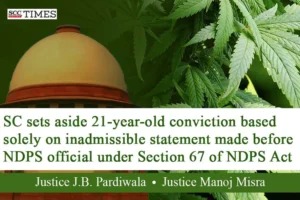Supreme Court: In a criminal appeal against Gujarat High Court’s decision, whereby the convict’s appeal against the Trial Court’s decision, holding the convict guilty of the offences punishable under Sections 8(c), 21(c) read with Section 29 of the Narcotic Drugs and Psychotropic Substances Act, 1985 (‘the NDPS Act’), was dismissed, the Division Bench comprising of JB Pardiwala and Manoj Misra, JJ. allowed the appeal and quashed the impugned orders.
In the matter at hand, five individuals, including the present convict, were put to trial in the Court of Additional Sessions Judge and Fast Track Judge Court, for the abovesaid offences. The Prosecution’s case was that the original accused was found to be in conscious possession of 624 grams of brown sugar. The original accused’s statement was recorded as a confession under Section 67 of the NDPS Act, which resulted in his incrimination, as well as of the present convict. The statement of the present convict was also recorded under Section 67 of the NDPS Act, which was incriminating. During the trial, the statement recorded under Section 67 of the NDPS Act was read into evidence and accordingly, the present convict was held guilty of the alleged offences by the Trial Court, vide order dated 21-06-2003. The appeal before the High Court was dismissed. Hence, the present appeal.
On perusal of the impugned judgment, the Court noted that the entire conviction of the convict was based on his confessional statement recorded under Section 67 of the NDPS Act. The Court said that the law prevailing at the relevant point of time made the statements recorded by the Narcotics Control Bureau officials under Section 67 of the NDPS Act admissible in evidence.
The Court referred to Tofan Singh v. State of Tamil Nadu (2013) 16 SCC 31, wherein, while deciding that whether the officer investigating a matter under the NDPS Act would qualify as a ‘police officer’ or not, it was held that officers authorised under S. 53 of the NDPS were ‘police officers’ and the statements made to them under S. 67 were inadmissible in evidence.
Thus, the Court said that the prevailing position of law had changed, and any confessional statement made by an accused to an officer invested with the powers under Section 53 of the NDPS Act, is barred because such officers are ‘police officers’ within the meaning of Section 25 of the Evidence Act. A statement made by an accused and recorded under Section 67 of the NDPS Act cannot be used as a confessional statement in the trial of an offence under the NDPS Act.
Considering that the conviction of the present convict was based on his statement and that no other evidence was available, the Court allowed the appeal and set aside the conviction order.
[Rajkumar Hariram Gameti v. State of Gujarat, 2024 SCC OnLine SC 572, Order Dated: 22-02-2024]

